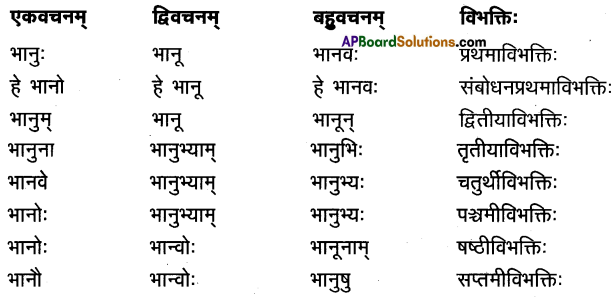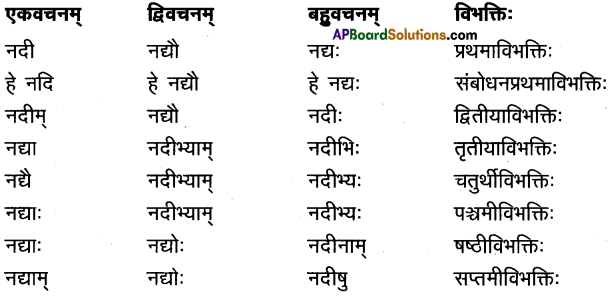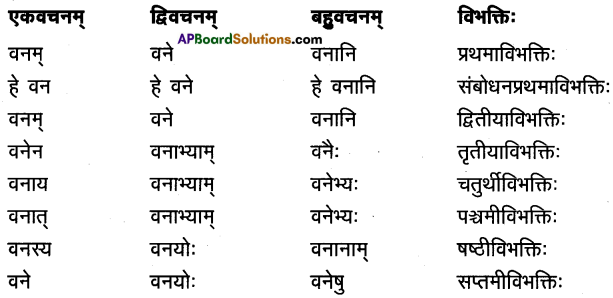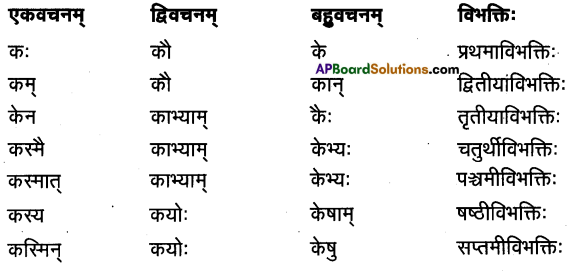Self-assessment with AP Inter 1st Year Sanskrit Model Papers Set 3 allows students to take charge of their own learning.
AP Inter 1st Year Sanskrit Model Paper Set 3 with Solutions
Time : 3 Hours
Max Marks : 100
सूचना : प्रथम, द्वितीय, तृतीयप्रश्नान् अनुवादप्रश्नं च विहाय अन्ये प्रश्नाः संस्कृतभाषायामेव समाधातव्याः ।
1. एकं श्लोकं पूरयित्वा भावं लिखत । (6 × 1 = 6 M)
अ) संपत्सु महतां ……………….. संघातकर्कशम् ।।
जवाब:
संपत्सु महतां चित्तम् भवेदुत्पलकोमलम् ।
आपत्सु च महाशैलशिलासंघातकर्कशम् ।।
The heart of the noble becomes soft like the lotus in prosperity. It is hard like a mountain rock during adversity.
आ) अपूज्या यत्र ……………… मरणं भयम् ।।
जवाब:
अपूज्या यत्र पूज्यन्ते पूज्यानां च व्यतिक्रमः ।
त्रीणि तत्र भविष्यन्ति दुर्भिक्षं मरणं भयम् ।।
Where the unworthy are honoured and the worthy are not honoured, three things happen there famine, death and fear.
![]()
II. एकं निबन्धप्रश्नं समाधत्त । (6 × 1 = 6 M)
अ) मायावटोः सम्भाषणकौशलं संक्षेपेण वर्णयत ।
जवाब:
Introduction : The lesson “Mayavatu” is taken from the work Kumarasambhava written by Kalidasa. The fifth canto of the work describes the arrival of Siva in the guise of a celibate to test Parvati.
The false celibate: A celibate, shining with spiritual glow, wearing deerskin and holding a staff of Palasa entered the hermitage of Parvati like the embodiment of Brahmacharya. After receiving the hospitality of Parvati he asked her whether fuel sticks and kusa grass were easily available. He further said that physical body is the primary means of dharma. शरीरमाद्यं खलु धर्मसाधनम् ।
The celibate’s query: Then he asked her the reason for her penance saying that friendship with the good happens in seven steps or words. मनीषिभिः साप्तपदीनमुच्यते | She was born in a noble family, beautiful, wealthy and young. She could not face any humiliation in her parental house. Her father’s abode was divine. She should not search for a husband as a gem does not search, it is searched for, न रत्नमन्विष्यति मृग्यते हि तत् । He offered her half of his penance to get her desired husband.
The reason for Parvati’s penance: The friend of Parvati told the celibate that having rejected Indra and others, Parvati wanted Siva as her husband. He was not to be won over by beauty as he destroyed Manmatha. When Parvati confirmed it, the celibate said that he would not support her as he knew Siva as one indulged in inauspicious practices.
Censure of Siva by the celibate : The celibate said that it would be inappropriate to let ashes take the place of sandal paste on the bosom of Parvati. People would smile seeing her riding a bull. Siva had deformed body. His birth was unknown.. His wealth was indicated by his nakedness.
Parvati’s reply: Then Parvati replied angrily that he did not know Siva properly. Stupid people despise the acts of the noble. Though penniless, Siva was the source of riches. He was the lord of the three worlds. No one knew whether his body ‘shone with ornaments or snakes, elephant hide or fine garments, and whether he held a skull or sported the crescent moon on the crest. Indra, who rode an elephant bowed to him. How could anyone know the origin of Siva, who was considered the cause of the creator? She said that her mind was fixed on him with the feeling of love.
When Parvati was about to go from there, Siva revealed himself to her and said that he became her slave. Fruition makes exhaustion fresh again. क्लेशः पुनर्नवतां विधत्ते ।
आ) उपवासदीक्षिताः कपयः कथं बुभुक्षापीडिताः ?
जवाब:
Introduction: The lesson कपीनामुपवासः was written by Srisailam Tatacharya, who was known as D. T. Tatacharya. He authored Kavyalankara and Mugdhanjali. In this satirical work he advises that imitating others is not good.
The greatness of the monkey race: Once the lord of the monkeys assembled all his followers and told them that previously their forefathers became great by their valour, strength and learning. Hanuman, who crossed the ocean, torched the city of Lanka and mastered the nine grammars belonged to their race only. He asked them that by what quality the humans became superior to them.
The decision of the monkeys: Then he asked them to find out why the monkeys should not have the same authority as the humans had. He told them that they should follow the customs or otherwise their animalhood would be well established. He suggested fasting on the day after as it was the Ekadasi day. The monkeys agreed to it.
Fasting of the monkeys on the Ekadasi day: The next day the monkeys took bath in the river and started their fast. But who could control his natural impulses? The monkeys became restless in a moment. They yawned, shook their hands, stretched their legs and kissed the tips of their tails. Then one of them suggested that they should go to the Jambu tree so that the next day breaking the fast would be easier.
The others agreed to it and moved to the tree. As they sat under the tree in a row, one of them suggested that they should climb the tree, and all of them did so. The juicy Jambu fruits: The monkeys passed the minutes like aeons. As the juicy fruits fell down making sounds when the branches were moved by the wind, their mouths watered. Then one of them said that they could as well keep the ripe fruits in the bag between their chins so that there would be no need to search for fruits the next day. Agreeing to it the monkeys jumped down and started to fill their mouths with the fruits.
The poet ends the story saying that what should be done afterwards need not be told to them.
III. एकं निबन्धप्रश्नं समाधत्त । (6 × 1 = 6 M)
अ) भोजमहाराजस्य यशः कीदृशमिति वर्णयत ।
जवाब:
Introduction: The lesson taken from the Bhojaprabandha written by Ballala. The poet lived in the eleventh century AD. He described the generosity of Bhoja in this lesson.
Bhoja meets Govinda : One day, while going to the pleasure garden, king Bhoja met a Brahmin. The Brahmin did not bless the king, and closed his eyes on seeing the king. When the king asked the Brahmin replied that on seeing a non-generous person in the morning, one would incur loss. Kings like Karna, Sibi and others lived even after death because of their charitable nature. One should earn fame in the perishable bodies. तस्मात् देहेष्वनित्येषु कीर्तिमेकामुपार्जयेत् ।
The king donated one lakh to that Govinda, and asked him to bring poets and scholars to the court. He became famous as a generous king. He removed his minister who told him kings became victorious by the strength of their treasury. He ordered that money and villages be granted to poets and scholars.
The Kalinga Poet : Once a poet from Kalinga came. He said that on seeing Bhoja, the enemies would drop their weapons, poets their suffering and women their saree-knot. The king gave him one lakh. The king donated five lakhs to a tribesman for his singing. The poet expressed his indignation in a verse referring to a lotus whose merits did not shine. यल्लक्ष्मीवसतेस्तव मधुपैरुपभुज्यते कोशः । The king donated him another lakh saying that the kings honoured talent only, and not lineage.
Other poets: Then five or six poets arrived there. The Kalinga poet said that it was the fault of the fragrance of the lotus that bees haunted its every petal. The king was pleased and gave another lakh to him. Later one of the poets said that it was a great lake where the filled and the unfilled pots did not collide.
The king gave him one lakh. Another poet said that the lake would satisfy the thirst of every one if only there was no crocodile inside. The king gave two lakhs to him. When Govinda expressed his dissatisfaction, the king removed him from his post. He appointed one of those poets in his place. The king told his minister that if uneducated, even a Brahmin should be sent out of the city, and if educated, even a potter should stay in the city. कुम्भकारोऽपियो विद्वान्सतिष्ठतुपुरेमम । In no time his court was filled with five hundred great poets including Vararuchi, Bana, Mayura etc.
Poet Sankara: One day a poet came to the court and read a verse in praise of the king. He said that whenever the fame of Bhoja increased as if to colour the three worlds white, he was afraid about the black hair of his wife. The king gave twelve lakhs to that poet Sankara.
![]()
आ) “स्वेदस्य पुष्पाणि” इति पाठ्यभाग सारांश लिखत ।
जवाब:
The Teacher’s Query:
Once a teacher, while going to the forest along with his students asked them which water was the best in the world. The students gave different answers such as the water of the Gangas, rain water and tears. The teacher then told them a story.
Sabari’s Hospitality :
While searching for Sita in the forest, Rama and Lakshmana met Sabari. She worshipped Rama, and offered him sweet fruits. There were beautiful and fragrant flowers in front of the place where Sabari lived. Rama asked her about those flowers.
Matanga and his students:
Sabari told him that the hermitage of Matanga used to be there at that place. Many students came for their studies to the hermitage. Once it was the end of the summer, and monsoon was about to set in. But no arrangement to store fuel sticks was made.
Sage Matanga and his students went to the forest, and cut wood. The young and the old carried the load on their heads and returned to the hermitage. Everyone was drenched in sweat. Beads of sweat dropped from the bodies on the ground.
The fragrance :
The next day everyone at the hermitage was surprised at the fragrance that spread there. The students found that the fragrance came from the direction of the forest where they went the day before. They went there and saw beautiful flowers blossomed here and there. Those flowers were not there the day before. The students ran back to Matanga, and reported to the teacher that strange incident. Matanga went there, and touched those flowers affectionately.
The flowers of sweat :
Matanga told his students that the flowers were born from their sweat. Sweat born of labour was pure. The heart of Mother Earth seemed to have bloomed up on seeing their effort. He told them that there was nothing purer than physical labour. If the farmer and the weaver did not work, there would be no crop or clothes. The world moved on because of the labourers. He advised them to respect the workers. The students promised Matanga that they would respect the labourers and see that they were comfortable.
Rama and Lakshmana bowed to those flowers and went away.
The real sweat :
Having told the story the teacher explained to his students that the sweat from which any useful thing was produced was the sacred and true sweat. He advised his students to make the lives of the workers happy when they grew up.
IV. चतुर्णां प्रश्नानां समाधानानि लिखत । (4 × 2 = 8 M)
अ) चाणक्यः कस्य राज्ञः अमात्यः ?
जवाब:
चाणक्यः चन्द्रगुप्तस्य राज्ञः अमात्यः । सः नन्दवंशम् उन्मूल्य चन्द्रगुप्तं सिंहासने अध्यारोपयत् ।
आ) राजसान्नवाच्याः के भवन्ति ?
जवाब:
अतिकषायपदार्थः, अतिलवणम्, अत्युष्णापदार्थः अतिक्षारपदार्थ:, अत्याम्लपदार्थः, अतिक्षातिदाहपदठार्थाः राजसान्नवाच्या भवन्ति ।
इ) सर्वे छात्राः बोपदेवं किमिति कथयन्ति स्म ?
जवाब:
सर्वे छात्राः बोपदेवं मूर्खशिखामणि इति कथयन्ति स्म ।
ई) कृपण किमर्थं सम्मानितवान् ?
जवाब:
कृपणः महान्तं त्यागं कृतवान् । तेन कारणेन सम्मानितवान् ।
उ) नागार्जुनः कः ?
जवाब:
नागार्जुनः रसायनशास्त्रज्ञः प्रसिद्धः चिकित्सकः च ।
ऊ) युवकः वणिजः गृहे केन रूपेण उद्योगं प्रप्तवान् ?
जवाब:
युवक: वणिजः गृहे भृत्यरूपेण उद्योगं प्राप्तवान् ।
V. द्वयोः संदर्भ व्याख्यानं लिखत । (3 × 2 = 6 M)
अ) एवं त्वं पुत्रशोकेन तत राजन् कालं करिष्यसि ।
जवाब:
परिचयः – एतत् वाक्यं दशरथस्य पश्चात्तापः इति पाठ्यभागात् स्वीकृतम् । अयं पाठ्यभागः वाल्मीकिरामायणे अयोध्याकाण्डतः स्वीकृतः ।
सन्दर्भः – तापसस्य वृद्धः पिता दशरथम् एवं शशाप |
भावः – राजन्, भवान् अपि पुत्रवियोगेन मरिष्यति ।
विवरणम् – दशरथः तापसस्य वृद्धं पितरम् अज्ञानतः आत्मना कृतं पापम् उक्तवान् । पुत्रस्य मरणं श्रुत्वा शोकमग्नः वृद्धः दशरथं शशाप भवान् अपि पुत्रशोकेन मरिष्यति इति ।
आ) मनीषिभिस्साप्तपदीनमुच्यते ।
जवाब:
परिचयः – एतत् वाक्यं मायावटुः इति पाठ्यभागात् स्वीकृतम् । एषः भागः कालिदासस्य कुमारसम्भवे पञ्चमसर्गात् स्वीकृतः ।
सन्दर्भः – मायावटुः पार्वतीम् एवं वदति ।
भावः – सतां स्नेहः सप्तपदैः भवति ।
विवरणम्: – तपोवनं एकः जटिलः प्रविवेश । सः अवदत् यत् पार्वत्या सत्कृतः सः परः न भवति । सत्पुरुषैः सह स्नेहः सप्तपदैः भवति ।
इ) जगति विबुधवाणि । त्वत्समा कास्ति मान्या ।
जवाब:
परिचयः – एतत् वाक्यं अमरवाणीप्रशस्तिः इति पाठ्यभागात् स्वीकृतम् । अस्य कविः श्रीमान् ई. शठकोपाचार्यः ।
सन्दर्भः – कविः अमरवाणीं प्रशंसन् एवं वदति ।
भावः – जगति संस्कृतभाषासमा अन्या भाषा नास्ति ।
विवरणम् – संस्कृतभाषा भवतापं शमयति, आनन्दं जनयति तथा शुभगार्गं दर्शयति । संस्कृतसमा अन्या भाषा नास्ति ।
ई) यतः प्रकृष्येत मतुष्यवर्गः ।
जवाब:
परिचयः – एतत् वाक्यं कपीनामुपवासः इति पाठ्यभागात् स्वीकृतम् । अस्य कविः श्रीशैलं ताताचार्यः |
सन्दर्भः – कपिसार्वभौमः अन्यान् कपीन् एवं वदति ।
भावः – मनुष्याः कथं प्रकर्षम् आप्नुवन्ति ।
विवरणम् – कपिसार्वभौमः वदति यत् कपयः लोकत्रये प्रसिध्दाः बभूवुः । परन्तु केन मनुष्याः प्रकर्षम् आप्नुवन्ति ।
![]()
VI. द्वयोः संदर्भ व्याख्यानं लिखत | (3 × 2 = 6 M)
अ) मूढो हि मदनेन आयास्यते ।
जवाब:
परिचयः एतत् वाक्यम् ‘कपिञ्जलोपदशः इति पाठ्यभागात् स्वीकृतम् । अस्य मूलग्रन्थः कादम्बरी । अस्य कविः बाणः ।
सन्दर्भः महाश्वेतायाम् अनुरक्तम् पुण्डरीकम् सन्मार्गे प्रवर्तयितुं कपिञ्जलः एवम् उपदिशति ।
अर्थः- मूर्खः एव मदनस्य वशे पतति ।
विवरणम् – कपिञ्जलः पुण्डरीकं वदति यत् पुण्डरीकस्य स्थितिः तस्य अनुरूपा न । तेन यत् आरब्धं तत् किम् ? तपः वा, व्रतं वा, नियमः वा ? मूर्खजनः एव मदनस्य वशे पतति ।
आ) अप्रियस्य च पय्यस्य वक्ता श्रेता च दुर्लभः |
जवाब:
परिचयः – एतत् वाक्यं भोजस्य औदार्यम् इति पाठ्यभागात् स्वीकृतम् । अस्य कविः बल्लालः ।
सन्दर्भः – भोजः गोविन्दम् एवम् अवदत् ।
भावः यः अप्रियमपि हितं वदति सः, यः तत् श्रुणोति सः च दुर्लभः ।
विवरणम् – दानं कुर्यात् इति गोविन्दस्य वचनानि श्रुत्वा सन्तुष्टः भोजः एवम् अवदत् – लोके प्रियवादिनः पुरुषाः सुलभाः । परन्तु अप्रियमपि हितं यः वदति सः, यः तत् श्रृणोति सः च दुर्लभः ।
इ) एतत् जगत् श्रामिकैः प्रचाल्यते ।
जवाब:
परिचयः – एतत् वाक्यं स्वेदस्य पुष्पाणि इति पाठ् यभागात् स्वीकृतम् । अस्य रचयित्री डा. माधवी जोषी ।
सन्दर्भः – मातङ्गः छात्रान् एवम् उपदिष्टवान् ।
भावः – श्रमजीविनां कारणात् एतत् जगत् प्रचलति ।
विवरणम् – श्रमजातः स्वेदः पवित्रः इति मातङ्गः उपदिष्टवान् । परिश्रमः एव पवित्रः । श्रमस्य स्वेदः न भवति चेत् जगत् न प्रचलति । इति उक्तवान् ।
ई) नायं मम दोषः । न वा शरदादीनाम् |
जवाब:
परिचयः – एतत् वाक्यम् वर्षापरिदेवनम् इति पाठ्यभागात् स्वीकृतम् । अस्य रचयिता आचार्य गुल्लपल्लि श्रीरामकृष्णमूर्तिः ।
सन्दर्भः – स्वच्छता कुत्र गता इति पृच्छन्ती वर्षादेवी एवं वदति ।
भावः – एष मम दोषः नास्ति । शरदादीनाम् दोषः अपि नास्ति ।
विवरणम् – वर्षादेवी स्वच्छजलेन विश्वप्राङ्गणं मार्जयति । तथापि विश्व कलुषितमेव दृश्यते । कस्य दोषः अयम् ? वर्षायाः तस्याः अनुजानां च दोषो नास्ति ।
VII. त्रयाणां प्रश्नानां समाधानानि लिखत । (3 × 2 = 6 M)
अ) प्रस्तुतपाठ्ंयशः कस्मात् उद्धृतः ?
जवाब:
प्रस्तुतपाठ्यांशः वाल्मीकिरामायणे अयेध्याकाण्डात् स्वीकृतः ।
आ) पार्वत्याः तपोवनं कीदृशः वटुः विवेश ?
जवाब:
अजिनाषाढधरः प्रगल्भवाक् ब्रह्ममयेन तेजसा ज्वलन् शरीरबद्धः प्रथमाश्रमः यथा कश्चित् वटुः पार्वत्याः तपोवनं विवेश ।
इ) सन्मित्रलक्षणं किमिति सन्तः प्रवदन्ति ?
जवाब:
पापात् निवारयति, हिताय योजयते, गुह्यं निगूहति, गुणान् प्रकटी करोति, आपद्गतं न जहाति, काले ददाति इति सन्मित्रलक्षणं सन्तः प्रवदन्ति ।
ई) सुकृते दुष्कृते च समभागिनः के ?
जवाब:
सुकृते दुष्कृते च कर्ता, कारयिता, प्रेरकः तथा अनुमोदकः समभागिनः ।
उ) कालेऽतीतेऽपि कान् स्मरामः ?
जवाब:
काले अतीते अपि व्यासवाल्मीकि कालिदासादीन् स्मरामः |
ऊ) वृक्षाणाम् आरेहणं कर्तुं कपयः कयं शक्ताः न भवन्ति ?
जवाब:
व्रतोपवासेन पीडिताङ्गाः सन्तः कपयः वृक्षाणाम् आरोहणं कर्तुं न शक्ताः भवन्ति ।
VIII. त्रयाणां प्रश्नानां समाधानानि लिखत । (3 × 2 = 6 M)
अ) कपिञ्जलः कस्मिन् संदर्भे पुण्डरीकं प्रति उपदेशवचनानि अवदत् ?
जवाब:
पुण्डरीकः महाश्वेतायाम् अनुरक्तः अभवत् । तपोजपादिनियमेषु अनासक्तः च अभवत् । तस्मिन् सन्दर्भे तं सन्मार्गे प्रवर्तयितुम् कपिञ्जलः उपदेशवचनानि अवदत् ।
आ) पुलिन्दपुत्रगानं श्रुत्वा भोजः कियत् धनं दत्तवान् ?
जवाब:
पुलिन्दपुत्रगानं श्रुत्वा भोजः तस्मै पञ्चलक्षं दत्तवान् ।
इ) पञ्चतन्त्रे कति भागाः सन्ति, ते के ?
जवाब:
पञ्चतन्त्रे पञ्च तन्त्राणि सन्ति । मित्रभेदः, मित्रसंप्राप्तिः, काकोलुकीयम्, लब्धप्रणाशः तथा अपरीक्षितकारकम् इति ।
ई) कः स्वेदः पवित्रः ?
जवाब:
श्रमजातः स्वेदः पवित्रः । कर्मणां स्वेदः पवित्रः |
‘उ) पत्रगतसन्देशः कः ?
जवाब:
यावत् पर्यन्तं गृहे भवन्तः अतिथिसत्कारं करिष्यन्ति तावत् पर्यन्तं भोजनार्थं मम श्रमः न भविष्यति । अहं दैवकार्यार्थं गमिष्यामि । मां मा अन्विष्यन्तु ।
ऊ) स्वच्छताया विषये सर्वकारः किं करोति ?
जवाब:
स्वच्छताया विषये सर्वकारः बहुयन्नान् करोति । नगरपालिकासु, परिशुद्धकर्मचारिणः नियुक्ताः । आकाशवाणी-दूरदर्शनीद्वारा बहु प्रचारयति ।
![]()
IX. पुस्तकप्रेषणविषये पत्रं लिखत । (1 × 5 = 5 M)
जवाब:
कडप
दिनाङ्कः 20-01-2018
सविधे –
मान्यसञ्चालकाः,
सरस्वतीविद्याप्रकाशन्,
विजयवाटिकॉ
मान्याः !
भवद्भिः प्रकाशितेषु अधोनिर्दिष्टानि पुस्तकानि मया यथानिर्दिष्टम् अपेक्ष्यन्ते ।
| क्र.सं | पुस्तकनाम | कविः | प्रतय: |
| 1 | कुमारसम्भवम् | कालिदासः | 5 |
| 2 | श्रीमद्रामायणम् | वाल्मीकिः | 4 |
| 3 | पञ्चतन्त्रम् | विष्णुशर्मा | 6 |
| 4 | भर्तृहरिसुभाषितानि | भर्तृहरिः | 3 |
कृपया एतानि पुस्तकानि वि.पि. पि. द्वारा अधोसूचितं सङ्केतं प्रति प्रेषयन्तु ।
सधन्यवादम् ।
भवदीयः / भवदीया
नाम …………….
गृहसंख्या 2-11-18
गान्धीरोड़, कडप |
(अथवा)
विरामग्रहणाय अभ्यर्थनपत्रं लिखत ।
जवाब:
गुन्टूर्
दिनाङ्कः 20-11-2018
सविधे –
प्रधानाध्यापकः / प्रांशुपालः
प्रभुत्व (जूनियर्) उच्चमाध्यमिक कलाशाला,
गुन्टूर्
मान्याः !
विषयः – विरामस्य कृते अभ्यर्थनम् ।
मम सोदर्याः विवाहार्थम् अहं श्वः स्वग्रामं गमिष्यामि । अतः कृपया दिनत्रयस्य 21-11-2018 तः 23-11-2018 पर्यन्तं विरामं यच्छन्तु इति सादरप्रणामपूर्वकं विज्ञापयामि । मम अनुपस्थितिसमये पाठ्यमानान् पाठान् मित्रसकाशात् ज्ञात्वा अहं पठिष्यामि ।
सधन्यवादम् ।
भवतां विधेयः छात्रः
नामः × × × × × × ×
अनुक्रमसंख्या × × × × × × ×
प्रभुत्व जूनियर् कलाशाला,
गुन्टूर् ।
X. द्वयोः शब्दयोः सविभक्तिकरूपाणि लिखत । (2 × 6 = 12 M)
अ) भानु
जवाब:

आ) नदी
जवाब:

इ) वन
जवाब:

ई) किम् (पुं.)
जवाब:

XI द्वयोः धातुरूपाणि लिखत । (2 × 3 = 6 M)
अ) खादति
जवाब:

आ) भाषताम्
जवाब:

इ) पठेत्
जवाब:

ई) जनिष्यते
जवाब:

XII. त्रीणि सन्धिनामनिर्देशपूर्वकं विघटयत । 3 × 2 = 6 M)
अ) वाणीशः
जवाब:
वाणी + ईश = सवर्णदीर्घ सन्धिः
आ) हितोपदेशः
जवाब:
हित + उपदेशः = गुण सन्धिः
इ) महोदार्यम्
जवाब:
महा + औदार्यम् = वृद्धि सन्धिः
ई) प्रत्युपकारः
जवाब:
प्रति + उपकार = यणादेश सन्धिः
उ) हरये
जवाब:
हरे + ए = अयवायाव सन्धिः
ऊ) कार्येऽपि
जवाब:
कार्ये + अपि = पूर्वरुप सन्धिः
![]()
XIII. त्रीणि सन्धिनामनिर्देशपूर्वकं सन्धत्त । (3 × 2 = 6 M)
अ) सु + उक्तिः
जवाब:
सूक्ति = सवर्णदीर्घ सन्धिः
आ) महा + ऋषिः
जवाब:
महर्षि = गुण सन्धिः
इ) गङ्गा + ओघः
जवाब:
गङ्गौघः = वृद्धि सन्धिः
ई) यदि + एकम्
जवाब:
यद्येकम् = यणादेश सन्धिः
उ) पौ + अक:
जवाब:
पावकः = अयवायाव सन्धिः
ऊ) सो + अपि
जवाब:
सोऽपि = पूर्वरुप सन्धिः
XIV. आन्ध्रभाषायां वा आङ्ग्लभाषायां वा अनुवदत । (5 × 1 = 5 M)
अ) अहं ग्रामं गच्छामि ।
जवाब:
I go to village.
आ) अहं परीक्षाम् अलिखम् ।
जवाब:
I wrote the exam.
इ) यूयं कदा खादिष्यथ ?
जवाब:
When will you eat ?
ई) विद्यासमं नास्ति शरीरभूषणम् ।
जवाब:
There is no ornament like education.
उ) हितं मनोहारि च दुर्लभं वचः ।
जवाब:
Words which are good and pleasing are rare.
XV. एकेन पदेन समाधत्त । (5 × 1 = 5 M)
अ) घटमादाय दशरथः कुत्र जगाम ?
जवाब:
आश्रमं ।
आ) “मायावदुः” इति पाठ्यभागः कस्मात् स्वीकृत: ?
जवाब:
कुमारसम्भवात् ।
इ) सुभाषित त्रिशातीति काव्यं केन रचितम् ?
जवाब:
भर्तृहरिणा ।
ई) कुलपावनः कः ?
जवाब:
पुत्रः
उ) विबुधावाणी कैः भवतापं शमयति ?
जवाब:
ब्रह्मविद्याप्रबोधैः ।
XVI. एकेन पदेन समाधत्त । (5 × 1 = 5 M)
अ) महाखेता का ?
जवाब:
एका गन्धर्व कन्या |
आ) भोजः शङ्करकवेः कियत् ददौ ?
जवाब:
द्वादश लक्षं ।
इ) शश – कपिञजलौ केन भक्षितौ ?
जवाब:
मार्जारेण ।
ई) तीर्थयात्रानन्तरं कुत्र तीव्रं तपरचकार ?
जवाब:
तिरुमलस्य-गोगर्भक्षेत्रे |
उ) हेमन्तातुजः कैः विखासमासिञ्चति ?
जवाब:
तुषारैः विश्वम् ।